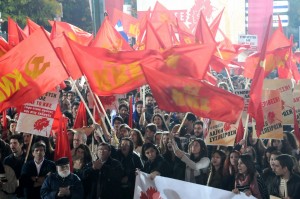
The crisis of capitalism since 2008 has sharpened the class struggle across the globe, nowhere more so than in Greece. Ultán Gillen looks at the role of the Greek Communist Party (KKE) in the current struggle.
“We feel bold and beautiful”. So said Greek Communist MP Liana Kanelli when Jon Snow of Channel 4 News asked her how the Greek people felt when the governments of other countries accused them of threatening the world economy.
She went on to ask why it was that these governments were so frightened by the prospect of democratic elections in Greece. The interview was itself recognition of the KKE’s leading role in resisting austerity policies designed to make workers pay for the crisis of capi- talism. While other parties have surrendered to the demands of finance capital, the KKE has consistently defended the democratic rights of the Greek people and the interests of the working class.
The KKE has been able to play this leading role because of its deep roots within the Greek working class. It is the third largest party in parliament, is represented in the European Parliament, its tens of thousands of party members are enormously active in trade unions and local communities. The party’s ability to mobilise massive numbers of working people has been demonstrated dozens of times in mass strikes over recent years. The basis of its leading role in articulating the democratic and socialist alternative is its history, class-conscious membership and coherent ideology.
The KKE was founded in November 1918 to effect the transition from capitalism to socialism in Greece. Its founding members, like today’s activists, saw themselves as the heirs to Greece’s democratic and radical tradition. Illegal for much of the period between 1918 and 1974, fascist oppression did not stop the KKE playing a central role in the resistance to Nazi occupation.
In the aftermath of the occupation, the KKE military force, the Democratic Army of Greece (which was made up of fighters from both sexes), fought an ultimately unsuccessful civil war against a British and American backed anti-communist government. The KKE continued its work in the decades after the civil war, opposing Greek involvement in NATO and providing leadership in the struggle for democracy against the US-backed junta of the colonels from 1967 to 1974.
Since 1974, the party has pushed for a socialist Greece independent of NATO, and has been a strong critic of the opportunities for increased exploitation of workers inherent in the European project.
Internationalism has remained at the core of its activities, with the KKE promoting dialogue over conflict as a way of resolving the long standing antagonism between Greece and Turkey.
The KKE has also overcome several attempts to dilute the party’s ideology and, despite a number of splits, has maintained its position as a dynamic force in Greek politics. An instructive comparison might be drawn with the Italian Communist Party, which also enjoyed mass support after World War II, but later watered down its ideology and ultimately disbanded in the early 1990s. Italy, unlike Greece, now lacks a well-organised and militant party of the working class.
“This is Greece, not Ireland. We, the workers, will resist!”
The above slogan, chanted during marches in Greece last year, reflects both the determination and the political understanding of the KKE and its associated trade union activists of PAME (the All-Workers Militant Front). The KKE has consistently pointed out that the so-called bailouts and rescue packages are not in the people’s interest; their real purpose is to protect the interests represented by the troika – the IMF, European Central Bank and EU – and the domestic bourgeois parties.
Since the onset of the current crisis the KKE has consistently pointed out that the real division in Greek political life is now between those prepared to implement the troika’s policies and those who will resist. The creation of a government of national unity in November that included such different forces as social democrats and fascists has proven it correct.
Now the leading opposition inside, as well as outside, parliament, the KKE is proposing an alternative – a social alliance. In the words of KKE General Secretary, Aleka Papariga:
“The front we need today must not be simply an ‘anti’ front. It must say where the people should go. And this determines its “anti” character. We are talking about a social popular front for the over-throw of the power of the monopolies, for their socialization, for the workers’ and people’s control, for the disengagement of Greece from the EU and NATO, and of course all these entail the cancellation of the debt.”
In other words, the KKE is not simply offering resistance to the anti-working class cuts. It is offering an alternative vision of a government based not on capital but on the working class, through a programme of democratisation, nationalisation, and liberation from the institutions of finance capitalism and aggressive imperialism.
Article published in LookLeft Vol.2 No.9




